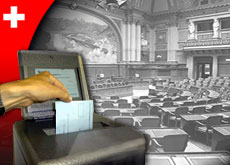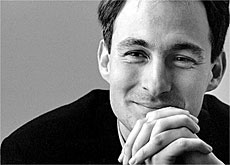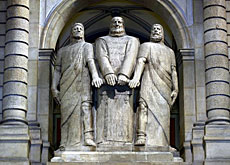Parliamentarians jockey for positions

It's election weekend in Switzerland and the bets are on as to the likely winners in the most important event in the political calendar.
In the run-up, interest has focused on several hotly contested seats in both the House of Representatives and the Senate, with the Centre-right most under attack.
Although parliamentary elections are increasingly seen by the media as a national event, most of the political wrangling takes place at a cantonal level.
Elections are held every four years in Switzerland, with parliamentarians elected directly by the people. The number of parliamentarians each canton sends to the 200-member House of Representatives depends on the size of the canton’s population.
This is not the case with Senate, where each canton sends two senators and each half canton sends one. There are 46 senators in total.
As with every election, most of the seats look safe, but there is likely to be a fierce battle for key seats in some cantons.
Risk
In Geneva, the president of the centre-left Social Democratic Party, Christiane Brunner, is fighting for her seat in the Senate.
Despite the strength of the left in Geneva, Brunner is being challenged by some left-wingers who say her policies are too moderate and who are nominating two of their own candidates.
Meanwhile, the centre-right Liberals are also vying for one of the canton’s two Senate seats and have put forward Jacques-Simon Eggly, currently a member of the House of Representatives.
Since Geneva’s electoral law prescribes a first-past-the-post system, Brunner is running a serious risk. She has already made it known she would resign from the party presidency if she is not re-elected.
Attack
In Zurich and Bern, the centre-right Radical Party is facing a challenge for its seats in the Senate from two Social Democrat candidates.
In Switzerland’s largest city, one of its seats is being vacated by Vreni Spoerry, one of the big guns of Swiss politics until a few years ago.
Radical politician Trix Heberlein – currently in the House of Representatives – is hoping to replace Spoerry, but Zurich’s popular former mayor and Social Democrat, Josef Estermann, is seen as a strong contender.
In canton Bern, it’s a similar scenario. While the seat held by the right-wing Swiss People’s Party senator, Hans Lauri, is solid, the Radical party’s seat is coming under attack from the Social Democrats’ Simonetta Sommaruga.
Sommaruga, a member of the House of Representatives, also chairs the Swiss foundation for consumer protection, and is one of Switzerland’s most popular parliamentarians.
The Radical’s seat is being vacated by Christine Beerli, one of the candidates tipped to take over from the outgoing cabinet minister, Kaspar Villiger. The party is defending its seat with Brigitte Bolli, a lesser-known politician from the cantonal parliament.
Rightwing challenge
In canton Schwyz in central Switzerland, it’s the right-wing Swiss People’s Party which is looking to make some gains. The party has set its sights set on a seat held by the Radical, Toni Dettling, who is stepping down.
Schwyz – along with cantons Fribourg and Vaud – is also one of the cantons that will be entitled to an extra seat in the House of Representatives next term, which is also likely to go to the People’s Party.
The new seats in Vaud – the canton’s 18th – should be within the reach of a left-wing alliance, including the Greens, but here too, it will be contested by the People’s Party.
The rightwing party – the big winner in the last cantonal elections – is also looking set to snap up Fribourg’s new parliamentary seat.
Southern politics
In Switzerland’s most southerly canton, Ticino, politicians will also be jockeying for position after the collapse of the rightwing Lega dei Ticinesi at the last cantonal elections.
A Lega parliamentarian, Flavio Maspoli, is accused of forging signatures on a petition needed for a referendum and many observers believe the movement will lose one of its two seats in Bern.
The other three parties with two members in House of Representatives – the Radicals, the Social Democrats and the Christian Democrats – are all hoping to win the seat.
The re-election of Ticino’s two senators, Dick Marty (Radical Party) and Filippo Lombardi (Christian Democrats) looks a certainty – despite Lombardi’s recent speeding conviction after his driving licence had been suspended for previous offences.
swissinfo, Andrea Tognina
On October 19, the Swiss go to the polls to elect a new House of Representatives and a majority of the Senate.
Parliamentary elections take place every four years.
Each canton represents a constituency and so residents can only vote on representatives in their home canton.
Unlike the United States or France, Switzerland has no presidential election, since the members of the cabinet or government are elected by parliament in a quasi-direct system of democracy.

In compliance with the JTI standards
More: SWI swissinfo.ch certified by the Journalism Trust Initiative


You can find an overview of ongoing debates with our journalists here . Please join us!
If you want to start a conversation about a topic raised in this article or want to report factual errors, email us at english@swissinfo.ch.